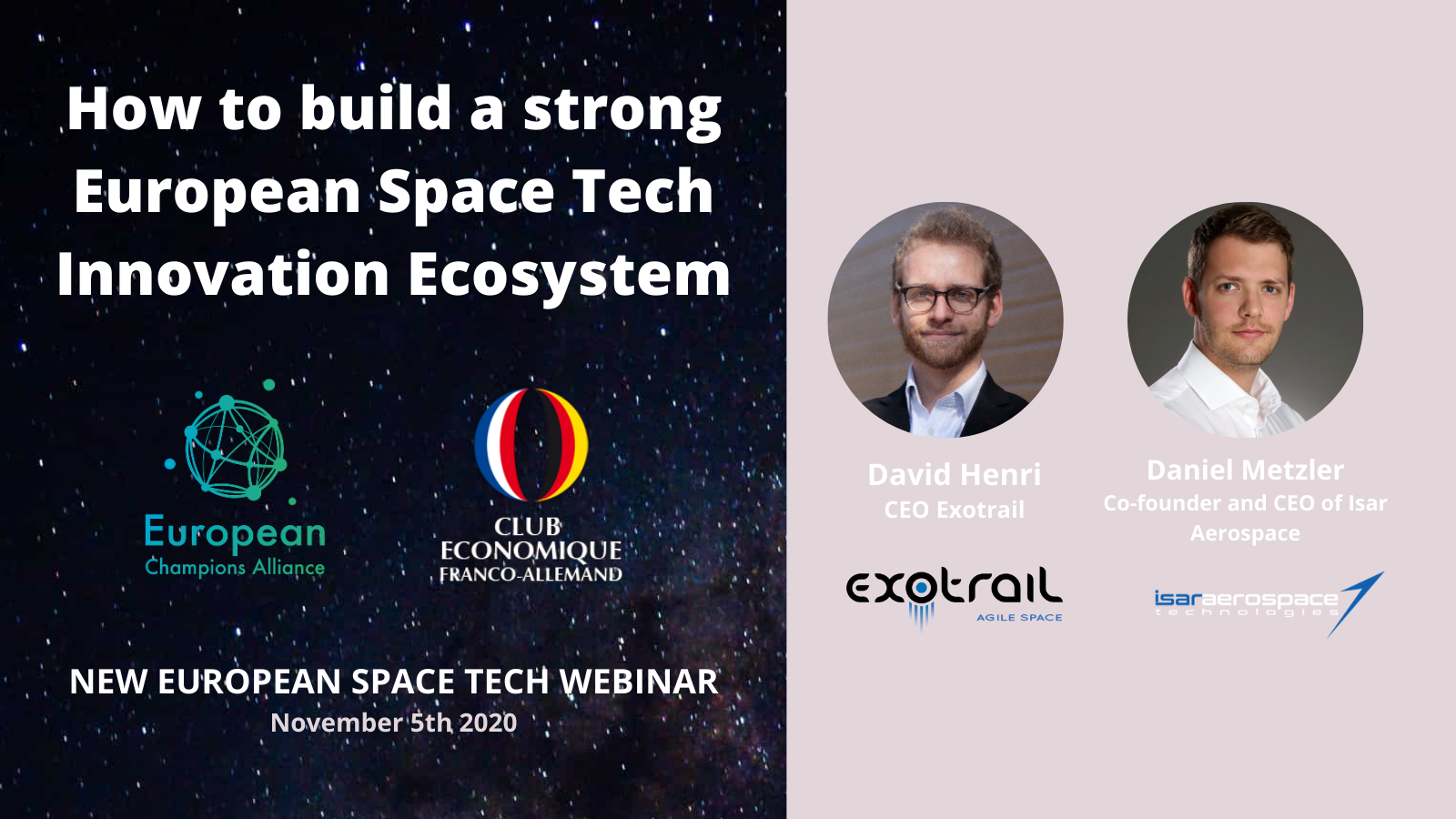
12 Feb New European Space Tech – How to build a strong European Space Tech ecosystem
The new space technology is currently moving at the speed of light in Europe and Space is an important driver of innovation in Europe. While space used to be synonymous with government spending, today the sector sees the emergence of new private actors who see commercial opportunities in space exploration and exploitation. New companies are emerging in our markets, disrupting the industry and generating new technologies, ideas and ways of working.
But being a small and new fish in the big pond that is the space industry, it can be hard become visible among the many large organisations and get into business.
This webinar took place on the 5th of November 2020. With our extraordinary speakers, two rising stars of the new European space technology ecosystem, we discussed:
- How do our future European Space Champions deal with challenges such as financing, finding customers and how do they plan to establish a sustainable business in such an expensive industry?
- How to create a win-win deal between New Space Tech and the conventional European space organisations?
- What is the promise of New Space? Will it disrupt or complement the ’conventional’ space ecosystem?
- How to handle the power struggle between Europe, the USA and China?
- What conditions do we need in Europe to enable start-ups and scale-ups that will change the way we see Space Tech in Europe?
MEDERATOR:
Andrea Vaugan, Directrice Générale European Champions Alliance
SPEAKERS:
David Henri, CEO Exotrail
David holds a degree in engineering and business strategy from Ecole Polytechnique, France’s leading scientific university. He completed his education with a master’s degree from the University of Cambridge in Industrial Systems, Manufacturing and Management. David has experience in the French Air Force and worked at Swiss Space Systems, a New Space start-up that designed a suborbital launcher for small satellites. He was an engineer in the propulsion department. He then worked in a venture capital company (ENGIE New Ventures).
David founded Exotrail in 2015. Since then, Exotrail has become a world leader in mobility solutions for space, has grown to more than 30 employees with more than 17 million euros raised and customers on two continents. David is President and CEO and leads Exotrail’s global strategy and management.
Exotrail develops mobility solutions for an agile space. Our propulsion systems, mission software and transport vehicles improve the deployment of small satellite constellations, increase performance and reduce space pollution.
Daniel Metzler, Co-founder and CEO of Isar Aerospace
Daniel Metzler (28) is co-founder and CEO of Isar Aerospace. Daniel previously led a team of 40 students in the Scientific Workgroup for Rocketry and Spaceflight (WARR) rocket research group, which develops sounding rockets. Daniel studied mechanical engineering at the Technical University of Vienna and aerospace engineering at the Technical University of Munich.
Isar Aerospace, based in Munich, the European aerospace location, was founded in 2018. The team aims to reduce barriers to commercial access to space for small satellites and satellite constellations by automating rocket production. It is supported by investors such as former SpaceX Vice President Bülent Altan, Earlybird and Airbus Ventures. Isar Aerospace provides satellite constellations with flexible, sustainable and cost-effective access to space. Backed by leading-edge research in rocket engineering, environmentally friendly fuels and advanced manufacturing, Spectrum precisely places small and medium-sized payloads into orbit.
After two years of development, an important milestone was reached on September 7: production of the first rocket begins. In the presence of Bavarian Prime Minister Markus Söder and TUM President Thomas F. Hofmann, the young entrepreneurs inaugurated their 4,500 square-meter production halls in Ottobrunn near Munich. Initially, production is expected to be successful with 100 employees – more will follow.
The next step is also already in sight: in 2021, the first transport rocket, loaded with small satellites, will be launched into orbit. If everything goes according to plan, mass production can begin immediately afterwards – Isar Aerospace plans to build 20 rockets per year.


